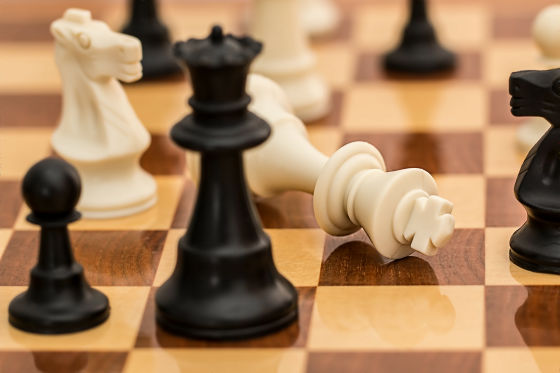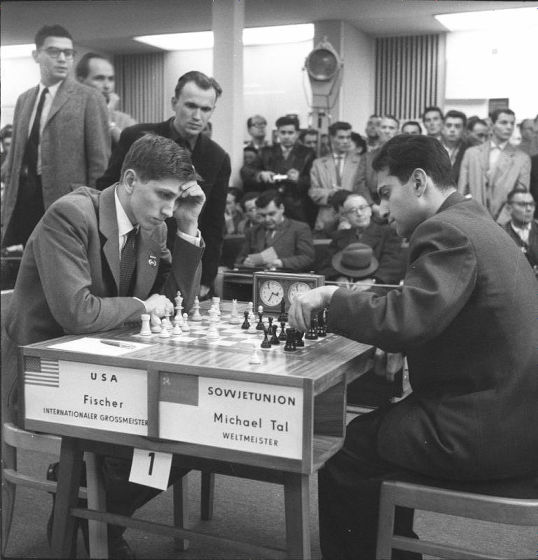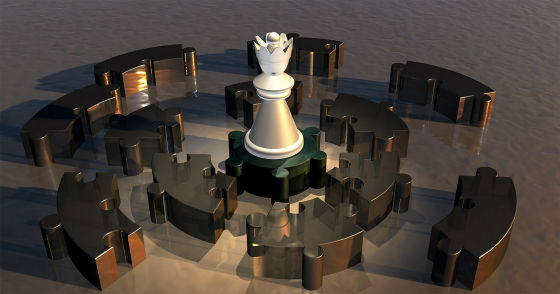Is it due to "female consciousness" that women lose competition with men?

"Disparity based on sex" that there are many cases that women are disadvantageous compared to men is strictly remained in the company's successive career competition, and opinions have been issued that should be resolved. However, in the "competition" the idea that women are inferior to men persists deeply, and a number of studies supporting this are also being issued. Under such circumstances, the reason why women do not face competition rather than men is not due to congenital characteristics of birth, but rather that they may be due to the acquired cause of "women's consciousness" that the environment creates Studies suggesting that have been announced.
What a game of chess can tell us about the gender gap | World Economic Forum
https://www.weforum.org/agenda/2017/01/what-a-game-of-chess-can-tell-us-about-the-gender-gap
There are many studies that men are superior to females in "competition", and in these studies the difference between male and female 'reaction' to competition is cited as a cause. Stanford University'sResearch in 2003(PDF file), it is pointed out that women's performance does not improve while men's performance improves as the competitive pressure of the environment increases,Research in 2007(PDF file) also reported that women dislike working with men even in non-competitive environments. In the study of gender differences in these competitions, there are many that conclude that women inherently hate competition and are not good at competition.
However, research reports that women are more disadvantaged than men in competition is not congenital and may be based on acquired factors.
Gender, Competition and Performance: Evidence from Real Tournaments by Peter Backus, Maria Cubel, Matej Guid, Santiago Sanchez-Pages, Enrique Mañas :: SSRN
https://papers.ssrn.com/sol3/papers.cfm?abstract_id=2858984
The research group of Dr. Peter Bacchus of Warwick University explored the cause of superiority in male-female competition, due to the difference in gender capability in the chess world. The game of chess is different from the point that men and women compete equally in equal terms, there is no influence of luck on winning and losing, the ability and ability are accurately reflected, and that there is a rating which is an index that can objectively measure the ability The researchers thought that it is perfect for inferring pure properties against competition.

However, the disparity between men and women exists strictly in chess world as well. For example, only 2% of female players fight at chess' world competition, and only women entering the top 100 are Chinese chess players Hoe Eh fans. Even though it is not a dream for the president of a woman to be born in the United States, it is a common view that it is the dream of a women's chess champion to be born.
Averaging the real power differences that exist between men and women in chess competition and numerical values is "IloratingIt is estimated that it will be evaluated as "15% lower". This difference was obvious, and it was a chess player's success in the 1960sBobby Fischer"They are all weak, they are foolish compared to men, women should not play chess, it's as if they are beginners," or a British chess playerNigel ShortThe players have produced a situation that makes remarks of women's disdain that "girls do not have a brain that plays chess."

However, Dr. Bacchus points out that the fixed idea that "women are inferior to men in the world of chess" is the reason why women can not dig into the top in chess. In the research of Dr. Bacchus, we focused on the difference in performance by gender of women and men's opponents. In the fight between females with almost the same irro rating score, the probability that each player will win is 50%, whereas if the opponent is male, the female player has the same rating score and equal ability Nevertheless the winning percentage has remained at 46%. The result of winning or losing seems to be equivalent to that women carry handicap of 30 points in Irolater.
In addition, the researchers used 3000 Ilorating chess machines that are more competent than the world's top players to make mistakes (bad hands) at key points in the middle of the game where the most creative hand in each game is required We analyzed the ratio. As a result, the woman said that it was found that the rate of mistake is higher in the case of male. On the other hand, in the case of men, the quality of play was not influenced by the sex of the partner.

Following this result, researchers point out the possibility that "stereotypes prevailing in men's dominance over the chess world are affecting." Those suffering from negative stereotypes are known to have anxiety trying to avoid it and to accept and follow fixed ideas in many cases, and it is known that a stereotype "male is strong" Dr. Bacchus thinks that there is a possibility that the real ability could not be demonstrated by being tied up.
Researchers have also discovered that the quality of male play changes depending on opponents in a place different from the "percentage of mistakes". Giving up in a situation where the loss is rich in the chess game is gracefully evaluated as "gentlemanly" behavior, but in the case of a woman, men tend to delay acceptance of defeat is.
Related Posts:
in Science, Posted by darkhorse_log







